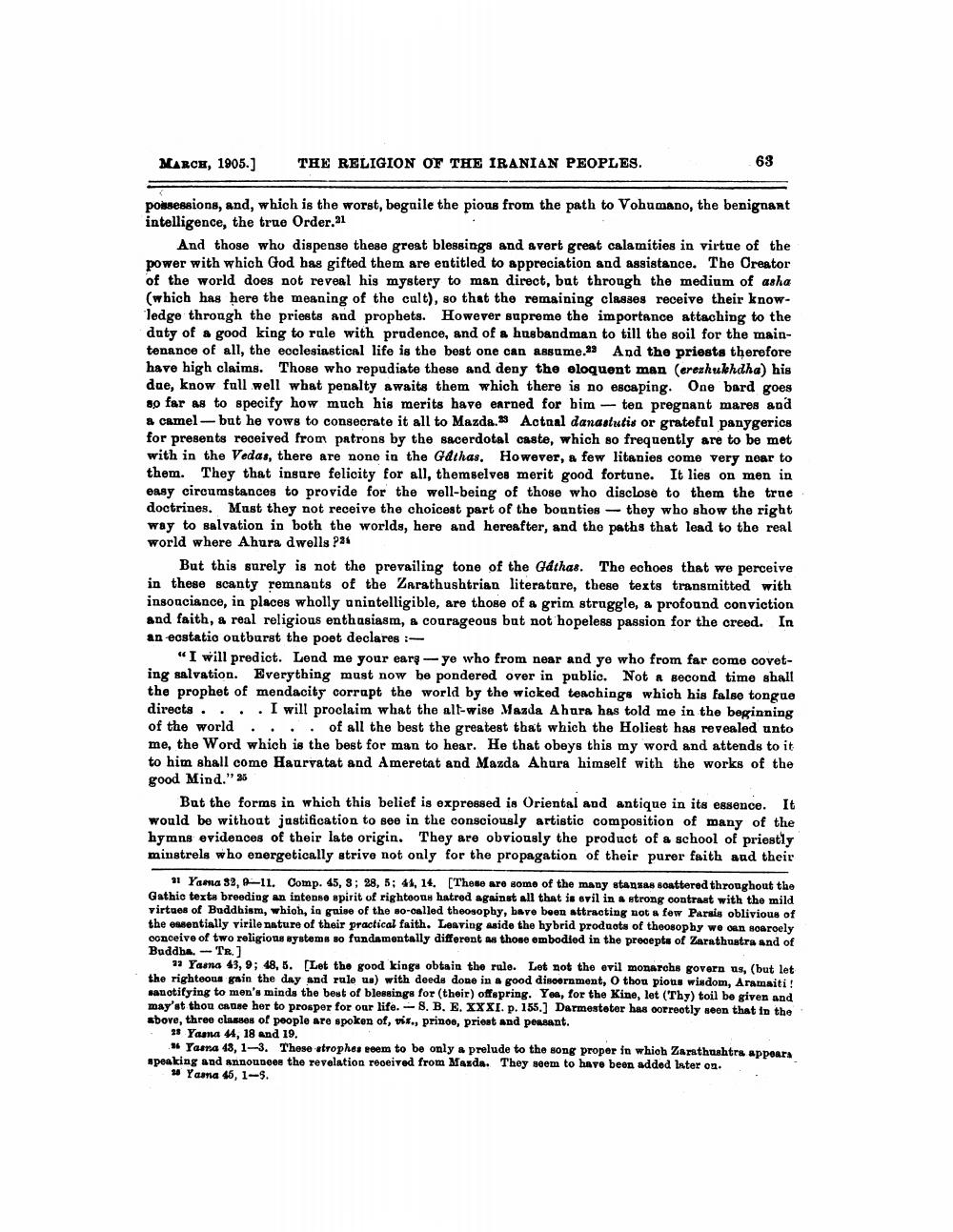________________
MARCE, 1905.)
THE RELIGION OF THE IRANIAN PEOPLES.
68
possessions, and, which is the worst, begaile the pious from the path to Vohumano, the benignant intelligence, the true Order.21
And those who dispense these great blessings and evert great calamities in virtue of the power with which God has gifted them are entitled to appreciation and assistance. The Creator of the world does not reveal his mystery to man direct, but through the medium of asha (which has here the meaning of the calt), so that the remaining classes receive their knowledge through the priests and prophets. However supreme the importance attaching to the duty of a good king to rule with pradence, and of a husbandman to till the soil for the maintenance of all, the ecclesiastical life is the best one can assume.42 And the priests therefore have high claims. Those who repudiate these and deny the eloquent man (erezhukhdha) his dae, know full well what penalty awaits them which there is no escaping. One bard goes 89 far as to specify how much his merits have earned for him - ten pregnant mares and a camel - but he vows to consecrate it all to Mazda. Actual danastutis or grateful panygerics for presents received from patrons by the sacerdotal caste, which so frequently are to be met with in the Vedas, there are none in the Gathas. However, a few litanies come very near to them. They that insure felicity for all, themselves merit good fortune. It lies on men in easy circumstances to provide for the well-being of those who disclose to them the true doctrines. Must they not receive the choicest part of the bounties - they who show the right way to salvation in both the worlds, here and hereafter, and the paths that lead to the real world where Ahura dwells 221
But this surely is not the prevailing tone of the Gathas. The echoes that we perceive in these scanty remnants of the Zarathushtrian literature, these texts transmitted with insouciance, in places wholly unintelligible, are those of a grim struggle, a profound conviction and faith, a real religious enthusiasm, & courageous but not hopeless passion for the creed. In an ecstatic outburst the poet declares :
"I will predict. Lend me your ears - ye who from near and ye who from far come coveting salvation. Everything must now be pondered over in public. Not a second time shall the prophet of mendacity corrupt the world by the wicked teachings which his false tongue directa . ... I will proclaim what the all-wise Mazda Ahura has told me in the beginning of the world .... of all the best the greatest that which the Holiest has revealed unto me, the Word which is the best for man to hear. He that obeys this my word and attends to it to him shall come Haurvatat and Ameretat and Mazda Ahura himself with the works of the good Mind." 25
But the forms in which this belief is expressed in Oriental and antique in its essence. It would be without justification to see in the consciously artistic composition of many of the hymns evidences of their late origin. They are obviously the product of a school of priestly minstrels who energetically strive not only for the propagation of their purer faith and their
1 Yama 33, -11. Comp. 45, 3; 38, 3; 41, 14, [These are some of the many stan as soattered throughout the Gathic texta breeding an intense spirit of righteous hatred against all that is evil in a strong contrast with the mild virtues of Buddhism, which, ia guise of the so-called theosophy, bave been attracting not a few Parsis oblivious of the essentially virile nature of their practical faith. Leaving aside the hybrid produots of theosophy we oon soaroely conceive of two religions systems so fundamentally different as those embodied in the precepts of Zarathustra and of Buddha. -TR]
19 Yanna 43, 9; 48,5. (Let the good kings obtain the rule. Let not the evil monarchs govern us, (but let the righteous gain the day and rulo ua) with deeds done in a good discernment, thou pious wisdom, Aramaiti! sanotifying to men's minds the best of blessings for (their) offspring. Yon, for the Kine, let (Thy) toil be given and may'st thou canse her to prospor for our life. -S. B. E. XXXI. p. 155.] Darmostater has correctly seen that in the above, three classes of people are spoken of, vis., prinos, priest and peasant. - 25 Yanna 44, 18 and 19.
3. Yamna 13, 1-3. These strophes seem to be only a prelude to the song proper in which Zarathustra appeara speaking and announces the revelation received from Mazda. They seem to have been added Inter on.
46 Yasna 45, 1-5.




